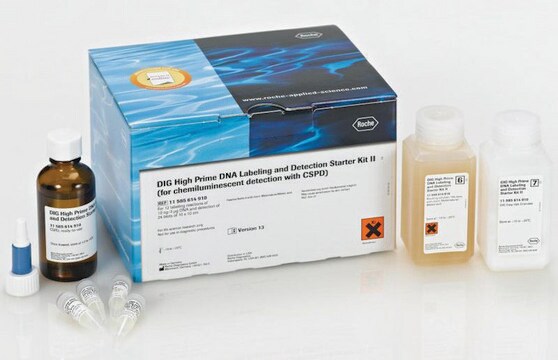11585592001
Roche
High Prime
solution, sufficient for 50 labeling reactions, pkg of 200 μL
Sinonimo/i:
high prime, labeling mix
Autenticatiper visualizzare i prezzi riservati alla tua organizzazione & contrattuali
About This Item
Codice UNSPSC:
41105500
Prodotti consigliati
Forma fisica
solution
Livello qualitativo
impiego
sufficient for 50 labeling reactions
Confezionamento
pkg of 200 μL
Produttore/marchio commerciale
Roche
Temperatura di conservazione
−20°C
Descrizione generale
Contents:
5x concentrated random primer mix: 1 U/μl Klenow polymerase, labeling grade, 0.125 mM dATP, 0.125 mM dGTP, 0.125 mM dTTP in 50% (v/v) glycerol.
5x concentrated random primer mix: 1 U/μl Klenow polymerase, labeling grade, 0.125 mM dATP, 0.125 mM dGTP, 0.125 mM dTTP in 50% (v/v) glycerol.
Enzyme and nucleotide mixture for rapid random-primed labeling of DNA with [32P], [35S], or [3H] dCTP. In this method, the complementary DNA strand of denatured DNA is synthesized by Klenow polymerase using the 3′-OH termini of the random oligonucleotides as primers.
High Prime is used for rapid random-primed labeling of DNA with [32P], [35S], or [3H]dCTP to a guaranteed specific activity of >2 x 109 dpm/μg. Incubation time is only 10 minutes at +37°C.
High Prime guarantees efficient labeling of:
High Prime guarantees efficient labeling of:
- DNA amounts ranging from 10 ng to 3 μg in a standard reaction
- DNA of different lengths ranging from small restriction fragments to l or cosmid DNA
- DNA, supercoiled or linearized
- DNA in low melting-point agarose.
High Prime, a novel labeling mixture, contains optimal concentrations of nucleotides and primers in a highly efficient reaction mix with Klenow enzyme. This convenient "all-in-one" principle of High Prime reduces pipetting steps to a minimum, and increases accuracy and reproducibility of labeling reactions.
Specificità
Heat inactivation: Stop the reaction by adding 2 μl 0.2 M EDTA (pH 8.0) and/or by heating to 65 °C for 10 minutes.
Applicazioni
For the labelling of DNA with radioactive dCTP using random oligonucleotides as primers.
High Prime-labelled probes are used in a variety of hybridization techniques: Southern blots
High Prime has been used to label the probes by random hexamer labelling and labelling of probes with 32P by random priming.
High Prime-labelled probes are used in a variety of hybridization techniques: Southern blots
- Northern blots
- Dot/slot blots
- Screening of gene libraries
- In situ hybridizations
High Prime has been used to label the probes by random hexamer labelling and labelling of probes with 32P by random priming.
Qualità
Function tested in the standard assay.
Principio
Labeled probes are generated with High Prime according to the random-primed labeling technique. High Prime is a specifically developed reaction mixture containing random oligonucleotides, Klenow polymerase, labeling grade, dATP, dGTP, and dTTP in an optimized reaction buffer concentrate in 50% glycerol for rapid and efficient labeling of DNA with [32P]-, [35S]-, or [3H]-labeled dCTP.
Risultati analitici
Specific Activity: The standard assay routinely yields a specific activity of 2 x 109 dpm/μg, using different substrate DNAs after 10 minutes of incubation.
Assay Time: 30 minutes
Sample Materials
Assay Time: 30 minutes
Sample Materials
- DNA fragments of at least 100 bp
- Linearized plasmid, cosmid or λDNA
- Supercoiled DNA
- Or minimal amounts of DNA (10 ng), e.g., DNA restriction fragments isolated from gels or in molten agarose
Altre note
For life science research only. Not for use in diagnostic procedures.
Codice della classe di stoccaggio
12 - Non Combustible Liquids
Classe di pericolosità dell'acqua (WGK)
WGK 1
Punto d’infiammabilità (°F)
No data available
Punto d’infiammabilità (°C)
No data available
Certificati d'analisi (COA)
Cerca il Certificati d'analisi (COA) digitando il numero di lotto/batch corrispondente. I numeri di lotto o di batch sono stampati sull'etichetta dei prodotti dopo la parola ‘Lotto’ o ‘Batch’.
Possiedi già questo prodotto?
I documenti relativi ai prodotti acquistati recentemente sono disponibili nell’Archivio dei documenti.
Pof8 is a La-related protein and a constitutive component of telomerase in fission yeast
Paez-Moscoso DJ, et al.
Nature Communications, 9(1), 587-587 (2018)
Network plasticity of pluripotency transcription factors in embryonic stem cells
Filipczyk A, et al.
Nature Cell Biology, 17(10), 1235-1235 (2015)
Il team dei nostri ricercatori vanta grande esperienza in tutte le aree della ricerca quali Life Science, scienza dei materiali, sintesi chimica, cromatografia, discipline analitiche, ecc..
Contatta l'Assistenza Tecnica.
![Adenosine 5′-[γ-thio]triphosphate tetralithium salt ≥75% (HPLC), powder](/deepweb/assets/sigmaaldrich/product/structures/319/398/e29221c2-3649-455b-bd33-583bb017ec7d/640/e29221c2-3649-455b-bd33-583bb017ec7d.png)


